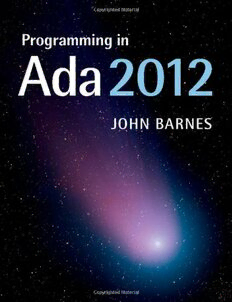Table Of ContentProgramming
in Ada 2012
Programming
in Ada 2012
JOHN BARNES
UniversityPrintingHouse,CambridgeCB28BS,UnitedKingdom
CambridgeUniversityPressispartoftheUniversityofCambridge.
ItfurtherstheUniversity’smissionbydisseminatingknowledgeinthepursuitof
education,learningandresearchatthehighestinternationallevelsofexcellence.
www.cambridge.org
Informationonthistitle:www.cambridge.org/9781107424814
©JohnBarnes2014
Thispublicationisincopyright.Subjecttostatutoryexception
andtotheprovisionsofrelevantcollectivelicensingagreements,
noreproductionofanypartmaytakeplacewithoutthewritten
permissionofCambridgeUniversityPress.
Firstpublished2014
PrintedintheUnitedKingdombyClays,StIvesplc
TypesetByJohnBarnesInformatics
AcataloguerecordforthispublicationisavailablefromtheBritishLibrary
LibraryofCongressCataloguinginPublicationdata
ISBN978-1-107-42481-4Paperback
CambridgeUniversityPresshasnoresponsibilityforthepersistenceoraccuracy
ofURLsforexternalorthird-partyinternetwebsitesreferredtointhispublication,
anddoesnotguaranteethatanycontentonsuchwebsitesis,orwillremain,
accurateorappropriate.
To Barbara
Contents
Foreword xv
Preface xix
Part 1 An Overview 1
1 Introduction 3
1.1 Standard development 3
1.2 Software engineering 4
1.3 Evolution and abstraction 6
1.4 Structure and objectives of this book 8
1.5 References 10
2 Simple Concepts 11
2.1 Key goals 11
2.2 Overall structure 12
2.3 The scalar type model 17
2.4 Arrays and records 19
2.5 Access types 22
2.6 Errors and exceptions 23
2.7 Terminology 26
3 Abstraction 27
3.1 Packages and private types 27
3.2 Objects and inheritance 30
3.3 Classes and polymorphism 34
3.4 Genericity 40
3.5 Object oriented terminology 41
3.6 Tasking 43
4 Programs and Libraries 47
4.1 The hierarchical library 47
4.2 Input–output 49
vii
viii Contents
4.3 Numeric library 52
4.4 Running a program 54
Program 1 Magic Moments 59
Part 2 Algorithmic Aspects 63
5 Lexical Style 65
5.1 Syntax notation 65
5.2 Lexical elements 66
5.3 Identifiers 67
5.4 Numbers 68
5.5 Comments 71
5.6 Pragmas and aspects 71
6 Scalar Types 73
6.1 Object declarations and assignments 73
6.2 Blocks and scopes 75
6.3 Types 77
6.4 Subtypes 79
6.5 Simple numeric types 81
6.6 Enumeration types 87
6.7 The type Boolean 90
6.8 Categories of types 93
6.9 Expression summary 95
7 Control Structures 101
7.1 If statements 101
7.2 Case statements 105
7.3 Loop statements 108
7.4 Goto statements and labels 114
7.5 Statement classification 111
8 Arrays and Records 117
8.1 Arrays 117
8.2 Array types 122
8.3 Array aggregates 127
8.4 Characters and strings 132
8.5 Arrays of arrays and slices 135
8.6 One-dimensional array operations 138
8.7 Records 143
9 Expression structures 149
9.1 Membership tests 149
9.2 If expressions 151
9.3 Case expressions 155
Contents ix
9.4 Quantified expressions 157
10 Subprograms 161
10.1 Functions 161
10.2 Operators 169
10.3 Procedures 171
10.4 Aliasing 177
10.5 Named and default parameters 179
10.6 Overloading 181
10.7 Declarations, scopes and visibility 182
11 Access Types 189
11.1 Flexibility versus integrity 189
11.2 Access types and allocators 191
11.3 Null exclusion and constraints 198
11.4 Aliased objects 200
11.5 Accessibility 204
11.6 Access parameters 206
11.7 Anonymous access types 210
11.8 Access to subprograms 214
11.9 Storage pools 220
Program 2 Sylvan Sorter 223
Part 3 The Big Picture 227
12 Packages and Private Types 229
12.1 Packages 229
12.2 Private types 234
12.3 Primitive operations and derived types 241
12.4 Equality 247
12.5 Limited types 251
12.6 Resource management 257
13 Overall Structure 263
13.1 Library units 263
13.2 Subunits 266
13.3 Child library units 268
13.4 Private child units 272
13.5 Mutually dependent units 279
13.6 Scope, visibility and accessibility 283
13.7 Renaming 287
13.8 Programs, partitions and elaboration 292
Program 3 Rational Reckoner 297
x Contents
14 Object Oriented Programming 301
14.1 Type extension 301
14.2 Polymorphism 307
14.3 Abstract types and interfaces 315
14.4 Primitive operations and tags 318
14.5 Views and redispatching 328
14.6 Private types and extensions 334
14.7 Controlled types 342
14.8 Multiple inheritance 347
14.9 Multiple implementations 353
15 Exceptions 361
15.1 Handling exceptions 361
15.2 Declaring and raising exceptions 364
15.3 Checking and exceptions 370
15.4 Exception occurrences 372
15.5 Exception pragmas and aspects 376
15.6 Scope of exceptions 381
16 Contracts 385
16.1 Aspect specifictions 385
16.2 Preconditions and postconditions 388
16.3 Type invariants 399
16.4 Subtype predicates 405
16.5 Messages 413
17 Numeric Types 417
17.1 Signed integer types 417
17.2 Modular types 423
17.3 Real types 425
17.4 Floating point types 427
17.5 Fixed point types 430
17.6 Decimal types 436
18 Parameterized Types 439
18.1 Discriminated record types 439
18.2 Default discriminants 443
18.3 Variant parts 449
18.4 Discriminants and derived types 453
18.5 Access types and discriminants 456
18.6 Private types and discriminants 463
18.7 Access discriminants 465
19 Generics 469
19.1 Declarations and instantiations 469
19.2 Type parameters 475

